7
Art Style: PiCTOBiTS
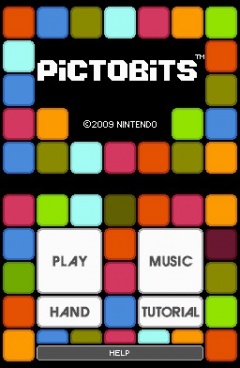 My Club Nintendo coins are finally going to good use, now that I can exchange them for games instead of cheap memorabilia. Fluidity was well worth zero dollars. And last month, I checked out Art Style: Cubello and found an interesting puzzle/lightgun hybrid.
My Club Nintendo coins are finally going to good use, now that I can exchange them for games instead of cheap memorabilia. Fluidity was well worth zero dollars. And last month, I checked out Art Style: Cubello and found an interesting puzzle/lightgun hybrid.
Another month, another Art Style game to grab from the Club. Pictobits (called Picopict in other territories) is my fourth from the series, all of them quite different from one another. Of the four, Pictobits is the closest to a traditional puzzle game, falling blocks and all. As someone who tends to burn out quickly on those competitive block-movers, I kept my expectations low.
But Pictobits surprised me. It gets frantic, no doubt, but the bite-size challenges and uncommon variety pulled me over the speedbumps in the difficulty curve. The retro Nintendo style didn't hurt, either.
Blackwell Convergence
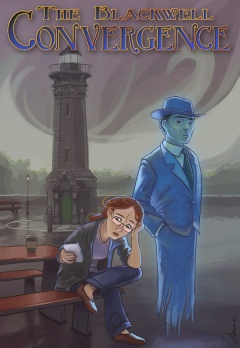 Blackwell Convergence follows The Blackwell Legacy and Blackwell Unbound in Wadjet Eye Games’ story-driven adventure game series. I found Unbound to be a stunning entry that rectified many of Legacy’s issues while building on the series’ mysteries. It also had a ton of style that is sadly absent in many games today.
Blackwell Convergence follows The Blackwell Legacy and Blackwell Unbound in Wadjet Eye Games’ story-driven adventure game series. I found Unbound to be a stunning entry that rectified many of Legacy’s issues while building on the series’ mysteries. It also had a ton of style that is sadly absent in many games today.
So I had high expectations for Convergence, as the story was brought back to present day with our original heroine Rosangela Blackwell. The detour Unbound took to the past was engrossing and informative, and gave the series that much more emotional weight. I knew it would be tough for Convergence to keep up the momentum, but I promised myself that if it did, I’d be waving the Blackwell flag for many years to come.
Released in 2009 for Windows and once again built in Adventure Game Studios, here’s my review for Blackwell Convergence.
Tales of Graces f
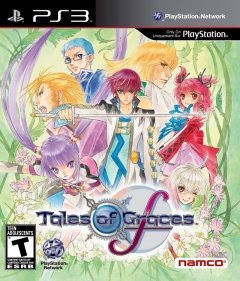 It was four minutes into Tales of Graces f that I met the amnesiac
with the impossible purple pigtails. She didn't know who she was, or
where she came from, or anything really. She was a deadly martial
artist, but nearly walked right off a cliff. Later she asked the meaning
of the word "friend." I threw up in my mouth a little and realized that
Graces f would be a tale quickly forgotten. In hindsight, I guess the
cover art should have served as warning.
It was four minutes into Tales of Graces f that I met the amnesiac
with the impossible purple pigtails. She didn't know who she was, or
where she came from, or anything really. She was a deadly martial
artist, but nearly walked right off a cliff. Later she asked the meaning
of the word "friend." I threw up in my mouth a little and realized that
Graces f would be a tale quickly forgotten. In hindsight, I guess the
cover art should have served as warning.
But if the whole game boiled down to waiting for the kid in the Elvis getup to realize that the king is possessed by a demon, I wouldn't have played it for almost ninety hours. Yes, a lot of time is wasted running errands through copy-paste corridors while the characters say how they feel and explain magical jargon. But then you run into a giant spider, and the kids' anime story melts away for a few seconds of glorious battle.
I'll even say that Tales of Graces f has my favorite RPG combat, taking the crown from predecessor Tales of Symphonia. Graces f layers new abilities and limitations onto Symphonia's melee-and-magic arena skirmishes, and the end result is a more dynamic structure that makes earlier games in the series look like button mashing. It's also complicated as hell.
Art Style: CUBELLO
 It's understandable that a hardware manufacturer like Nintendo would condemn app gaming.
The company makes its fortune on dedicated video game machines and the
traditional $30+ software pricing; the $1 mobile alternative is a
serious threat to the viability of that strategy, especially in the
handheld market. You won't see the House of Mario endorsing Angry Birds and its ilk any time soon (until it comes to 3DS, anyway).
It's understandable that a hardware manufacturer like Nintendo would condemn app gaming.
The company makes its fortune on dedicated video game machines and the
traditional $30+ software pricing; the $1 mobile alternative is a
serious threat to the viability of that strategy, especially in the
handheld market. You won't see the House of Mario endorsing Angry Birds and its ilk any time soon (until it comes to 3DS, anyway).
It's a shame that a Nintendo-branded smartphone is so unlikely, because gaming's biggest name already has a series perfectly suited for the bite-size mobile market. The little known Art Style franchise on WiiWare and DSiWare emphasizes "elegant design, polished graphics, and pick-up-and-play controls." Having played the gravity-manipulating Orbient on WiiWare and cardboard-factory simulator Boxlife on DSiWare, I can definitely see the Art Style brand as a viable and profitable iPhone series.
Last month I picked up Cubello, one of the earlier Art Style games on WiiWare, from the Club Nintendo rewards program. It looks like the offspring of Tetrisphere and a Rubik's Cube got caught in a light gun game. I like it better than either of those things, though.
The Blackwell Legacy
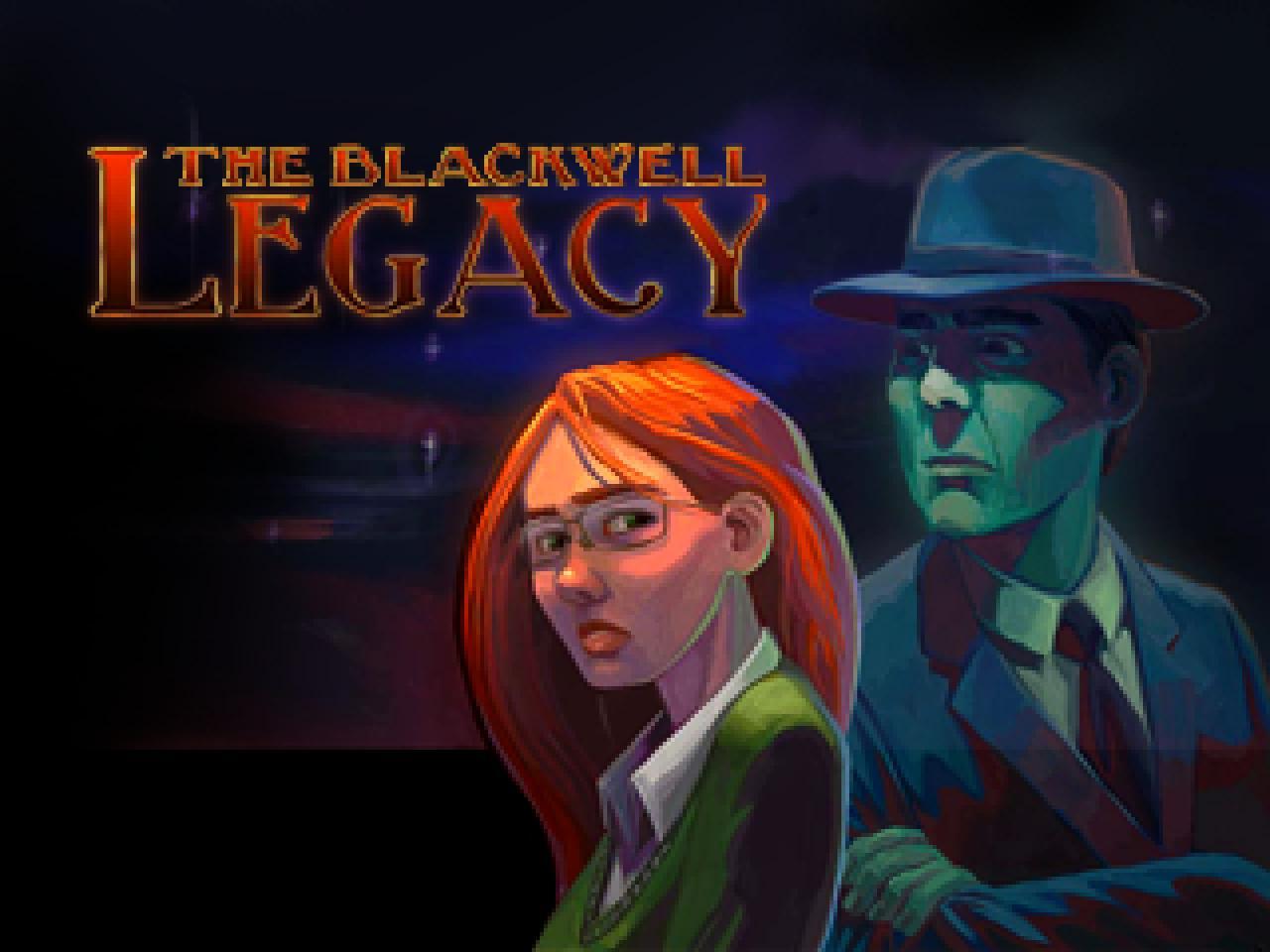 I played a lot of point and click adventures growing up, from the Monkey Island series to King’s Quest, but I figured the genre for dead over the last decade. What a pleasant surprise to find that it’s alive, well, and kicking in the indie community. Ben There, Dan That and Time Gentleman, Please! have been covered here before, and now I’ve discovered the delightful Blackwell series.
I played a lot of point and click adventures growing up, from the Monkey Island series to King’s Quest, but I figured the genre for dead over the last decade. What a pleasant surprise to find that it’s alive, well, and kicking in the indie community. Ben There, Dan That and Time Gentleman, Please! have been covered here before, and now I’ve discovered the delightful Blackwell series.
The Blackwell Legacy is the first game in an ongoing series of point and click adventures from Wadjet Eye Games. Set in modern day New York City, the game already sets itself apart from most of the fantasy elements Lucasarts and Sierra raised the genre in, except for one thing: the main character is accompanied by a ghost.
Recently featured in our Indie Impression column, The Blackwell Legacy was well received by all participants, and knowing it was a relatively short game, I had no qualms in playing on. Here are my thoughts on The Blackwell Legacy.
Deus Ex: Human Revolution
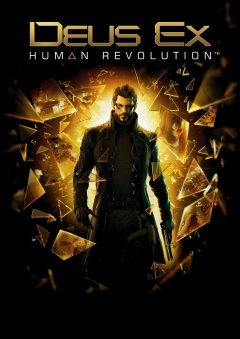 Evidently, I’ve been coddled by stealth-based videogames for far too long. Metal Gear Solid gives players a large radar on their HUD showcasing soldiers’ cones of vision, allowing me to know just how far they saw and when to make my move; it only jammed now and then, leaving Solid Snake feeling clothed yet naked, but otherwise the radar remained a constant and vital companion during the fall of FOXHOUND. The Tenchu franchised handed out safe rooftops like candy. The Sly Cooper games, no matter what locale, always offered a number of places to hide or grapple on or tip-toe across; it also taught me how to pickpocket with a cane. Assassin’s Creed: Brotherhood had so many ways to hide and blend in with the public that it almost seemed like the point of the game was to be a commoner and not a kick-ass, hidden blade-wielding Casanova—actually, that’s how their online multiplayer does it. Sneaking through the massive cities was never terribly tricky, and if you messed up, there always seemed to be a way to quickly erase your footprints and try again. While certainly some skill is needed, most videogames involving stealth are pretty forgiving.
Evidently, I’ve been coddled by stealth-based videogames for far too long. Metal Gear Solid gives players a large radar on their HUD showcasing soldiers’ cones of vision, allowing me to know just how far they saw and when to make my move; it only jammed now and then, leaving Solid Snake feeling clothed yet naked, but otherwise the radar remained a constant and vital companion during the fall of FOXHOUND. The Tenchu franchised handed out safe rooftops like candy. The Sly Cooper games, no matter what locale, always offered a number of places to hide or grapple on or tip-toe across; it also taught me how to pickpocket with a cane. Assassin’s Creed: Brotherhood had so many ways to hide and blend in with the public that it almost seemed like the point of the game was to be a commoner and not a kick-ass, hidden blade-wielding Casanova—actually, that’s how their online multiplayer does it. Sneaking through the massive cities was never terribly tricky, and if you messed up, there always seemed to be a way to quickly erase your footprints and try again. While certainly some skill is needed, most videogames involving stealth are pretty forgiving.
But then came Deus Ex: Human Revolution, a game I tried to play stealthily, but failed miserably, eventually throwing in the towel and just shooting enemies until they breathed no more. The first hour should’ve been a clear indication of what was to come, but I’m stubborn and continued to drop Praxis point after Praxis point into perks like “see through walls” and “hack computers up to level 5.” No points were ever devoted to fixing Jensen’s shooting ability or giving him more backpack space. All I needed—or so I thought—was my tranquilizer rifle, some darts, and the smarts to crack every keypad and computer this side of future Detroit. Turns out, I needed a lot more than that.
Kirby's Return to Dream Land
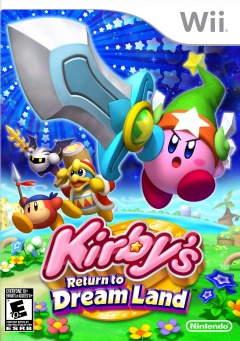 For the longest time, all I wanted from Nintendo was a new Kirby game with awesome copy abilities like in Kirby Super Star. No
franchise has a track record like Kirby when it comes to spinoffs and
experiments, but the SNES classic that boasted "8 games in one" is the
series' greatest feat. For over a decade, my wish went unfulfilled.
For the longest time, all I wanted from Nintendo was a new Kirby game with awesome copy abilities like in Kirby Super Star. No
franchise has a track record like Kirby when it comes to spinoffs and
experiments, but the SNES classic that boasted "8 games in one" is the
series' greatest feat. For over a decade, my wish went unfulfilled.
But hey, we finally got one, appropriately dubbed Kirby's Return to Dream Land! It's exactly what I wanted: the twenty standard copy abilities are the series' best, with strong debuts and enhanced returns counted among Kirby's repertoire. It's amazing how many tricks you have up your sleeve with just a D-pad and a single button.
You have to be careful what you wish for, though. When dealing with a genie or blowing out your birthday candles, always make sure to choose your words deliberately and plan for stipulations and potential fallouts. Otherwise, you might end up with Kirby's Return to Dream Land, a game with tons of cool attacks and not much worth attacking.
Tom Clancy's Ghost Recon: Shadow Wars
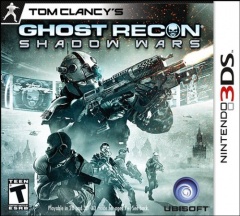 Very few titles available at a system's launch are ever worth the price
of admission. Thing is, they don't have to be: early adopters don't have
any other choices, and they certainly aren't taking home that shiny new
box with nothing to play. If a launch window game isn't a glitchy,
feature-stripped port of a last-gen game, then it may just be the best
of the bunch.
Very few titles available at a system's launch are ever worth the price
of admission. Thing is, they don't have to be: early adopters don't have
any other choices, and they certainly aren't taking home that shiny new
box with nothing to play. If a launch window game isn't a glitchy,
feature-stripped port of a last-gen game, then it may just be the best
of the bunch.
Ubisoft in particular doesn't have a great track record when it comes to launch games. They were the first third party to reveal their Wii hand with the ambitious and roundly disappointing Red Steel, threw straight up shovelware at the DS, and didn't exactly set any precedents at the dawn of the HD era, either. For the 3DS, Ubi's launch day contributions took the forms of Rayman 3D, Asphalt 3D, Combat of Giants: Dinosaurs 3D, and Ghost Recon: Shadow Wars.
It doesn't surprise me, then, that Ghost Recon: Shadow Wars is a technical mess. The visuals wouldn't turn heads on PSP, slowdown is common, and everything just feels rough around the edges. Oh, and then the game freezes every now and then. Sometimes you'll get the black screen of death, other times the audio will stop and the display will just fade out. In the time I was playing, Shadow Wars crashed on me a grand total of ten times.
What surprises me is that, despite these glaring technical issues, I will still recommend the game to 3DS early adopters.
999: Nine Hours, Nine Persons, Nine Doors
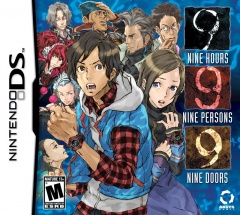 For the last few years, I’ve been attempting to answer the question “would I keep playing?” after finishing the first hour of a video game. It is kind of a loaded question, as I’m trying to answer for just myself, but also consider the millions of readers out there who might be wondering the same thing. I enjoy genres many people don’t, and I also have wildly varying opinions on a lot of games, so if I’m on the fence, I’ll generally give the game in question the thumbs up. In the end, the wording is important: I would keep playing if I had the time and energy to do so, but chances are I’m still chugging through Dragon Age: Origins.
For the last few years, I’ve been attempting to answer the question “would I keep playing?” after finishing the first hour of a video game. It is kind of a loaded question, as I’m trying to answer for just myself, but also consider the millions of readers out there who might be wondering the same thing. I enjoy genres many people don’t, and I also have wildly varying opinions on a lot of games, so if I’m on the fence, I’ll generally give the game in question the thumbs up. In the end, the wording is important: I would keep playing if I had the time and energy to do so, but chances are I’m still chugging through Dragon Age: Origins.
After a half-hour with the Nintendo DS game 999: Nine Hours, Nine Persons, Nine Doors, I was emphatically done (we sometimes give portable games just the 30 minute treatment with the assumption that being a portable game, they might get things rolling quicker). It was a bizarre experience, to say the least. But then its fans started to comment. Commenters arrive in many forms, sometimes they’re offended that I seemingly insulted their game as if it was their mother, but sometimes they come as defenders of justice. 999 fans appeared as the latter.
So I gave the game another shot, replayed the beginning and on from there. I beat 999 three times in total to achieve the true ending, and in the end, I enjoyed my experience. My final score for the game was hard to pin down, so pay more attention to the text than the number.
Nelson Tethers: Puzzle Agent
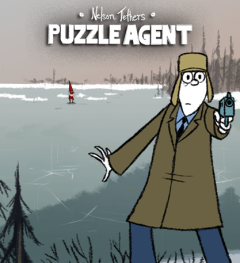 Nintendo has made a killing packaging classic pen-and-paper activities into DS games. Picross, Sudoku, Crosswords...but one of the major successes is the Professor Layton series. Developed by Level 5 and published by Nintendo outside of Japan, the franchise tasks players with solving puzzles and riddles in order to explore a storyline brimming with mystery. The puzzling travels of Professor Layton and his apprentice Luke are a hit with casuals and hardcore alike, selling over ten million units worldwide between the series' five titles.
Nintendo has made a killing packaging classic pen-and-paper activities into DS games. Picross, Sudoku, Crosswords...but one of the major successes is the Professor Layton series. Developed by Level 5 and published by Nintendo outside of Japan, the franchise tasks players with solving puzzles and riddles in order to explore a storyline brimming with mystery. The puzzling travels of Professor Layton and his apprentice Luke are a hit with casuals and hardcore alike, selling over ten million units worldwide between the series' five titles.
Of the three titles available outside Japan, I've only played the first, Curious Village. It's certainly full of cranium-crunching riddles, but I wasn't as taken by the rest of the package as many were. Decent production values aside, there wasn't much that impressed me from the strange story of Layton, Luke, and the peculiar villagers. I'd almost wished the game was a more sterile package, like so many other brainy DS productions. Most would probably disagree, seeing the worth in framing these teasers within a narrative.
Enter Nelson Tethers: Puzzle Agent. I bought this budget PC title in -- what else? -- a Steam bundle during the holiday season. Nelson clearly took notes from one of the Professor's lectures, because Puzzle Agent's premise is very similar to Curious Village, having the player explore a mysterious little town by solving riddles for its puzzle-obsessed populace. But unlike Curious Village, I actually enjoyed the overall experience even more than the puzzles that pervade it.
